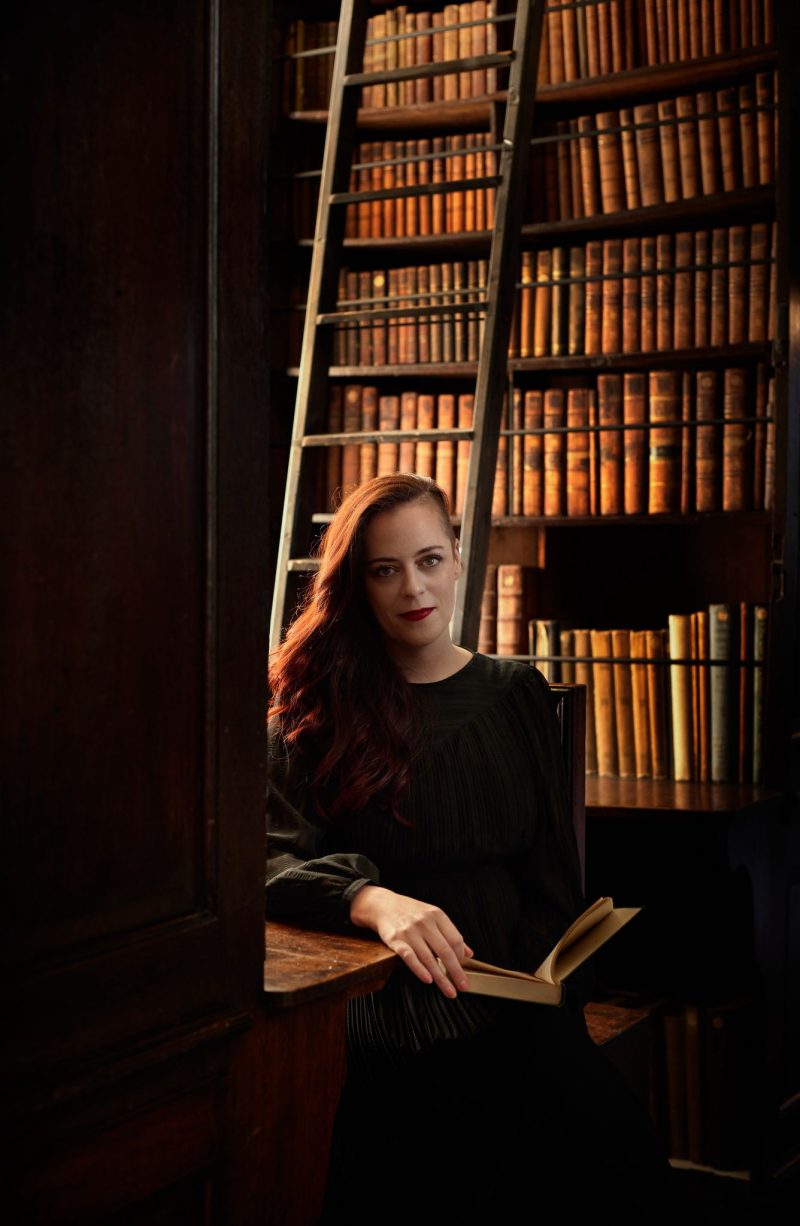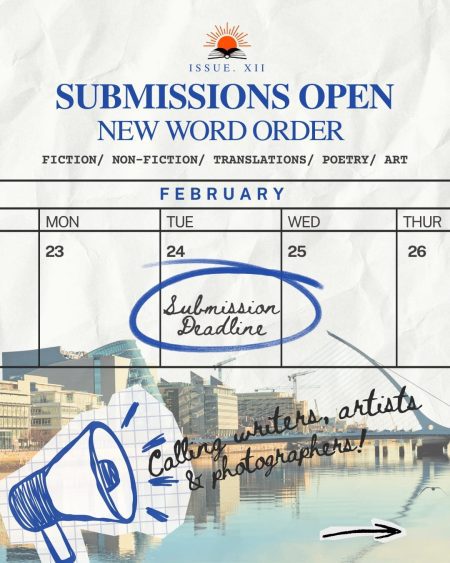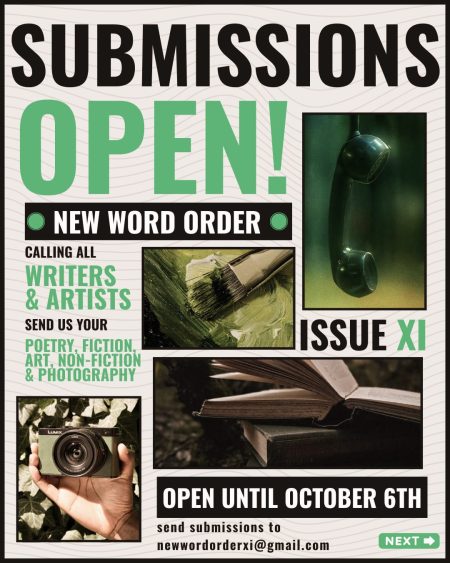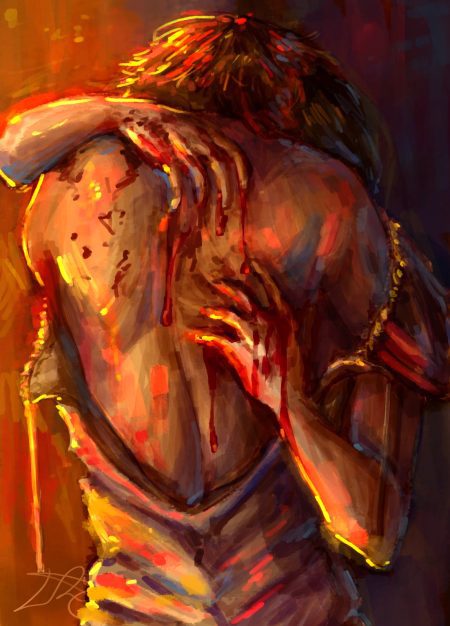Annemarie Ní Churreáin is the UCD/ Arts Council Writer in Residence for 2025. Ní Churreáin is a poet who has published three books: Bloodroot (2017), Town (2018) and The Poison Glen (2021). Ní Churreáin also works as poetry editor for the renowned Stinging Fly Magazine. Hailing from a Gaeltacht region in Donegal, folklore and family feature prominently in the work of Ní Churreáin. Ellen Clusker, New Word Order’s issue X submissions and interview manager, sat down with Ní Churreáin. The pair discussed all things writing from Ní Churreáin’s own process and inspiration to her advice for young artists.
Ellen Clusker: Are you working on any writing at the moment yourself? Or are you more focused on your role as writer in residence?
Annemarie Ní Churreáin: As a poet I’m always gathering new ideas. That gathering never stops! It’s been very energising to meet students through the “poet as troublemaker” workshops and to be inspired by their approaches to poetry. I’m also spending a lot of hours in the National Folklore Archives indulging my fascination with superstition, magic and the Otherworld. All of this thinking and dreaming feeds into my practice and is giving roots to the new opera libretto that I’m co-writing with Straymaker director/composer Michael Gallen. Michael and I have previously collaborated on Elsewhere, a partnership with The Abbey National Theatre. We’re now co-writing the libretto for The Curing Line which explores the world of folkloric cures. I’ve become interested in how and why these cures are passed down through family generations and how native traditions can give a sense of identity and belonging. Everything that I write here this year in UCD will nourish my collaborations and also my next poetry collection with The Gallery Press. I have already published two poetry collections, Bloodroot and The Poison Glen. Also, a pamphlet titled Ghostgirl. And it’s been a gift to have this space to think about the various threads that run like a river through my past and present projects. Another important dimension of this residency is engagement of the public through a series of poetry readings. Audiences are invited to come along on June 7th to the UCD Arts Festival where I’ll be sharing the stage with Donegal poet Moya Cannon and uilleann piper Maeve O’ Donnell. Finally, throughout the UCD residency I’ll be offering individual feedback sessions for emerging poets.
Ellen Clusker: ‘Ghostgirl’, wasn’t that a poem in ‘The Poison Glen?’ Did you take inspiration from that?
Annemarie Ní Churreáin:Yes, I did. I suppose this idea of the ghostgirl has been with me all during my writing life. The ghostgirl of Irish history of the Otherworld, of my own family. I have had quite a special relationship with my grandmothers, each of them. They’ve kind of been ghostgirl presences in my imagination as well. My Ghostgirl pamphlet looks at histories of Stranorlar Mother and Baby Home in Donegal which opened in the 19th century as a workhouse and continued as such throughout the Great Famine. By 1924 the workhouse had transformed into a state-run home for unmarried pregnant women and their children. Many of the poems are praise poems really, for the girls and women who were sent through that home in Donegal.
Like the youngest maternity admission to the Stranorlar Mother and Baby home in the 1920s was 13 years old. I wanted to write something that would celebrate the strength and resilience of these women and girls who went through a difficult moment in time and who survived. These women were survivors and, also, protestors, change-makers, truth-speakers. It’s part of my own family story and it’s part of the history that we’re all reckoning with in Ireland at the moment.
Ellen Clusker: How would you describe your writing process? Would you typically get hit with an idea out of the blue or is it something that develops and grows over time?
Annemarie Ní Churreáin: I would say that I’m very inspired by place first of all. By place I can mean a wild heather bog or a cityscape. Probably, that connection to place began at a very young age. Where you grow up gives shape to your voice and I grew up in north west Donegal. When I looked out my bedroom window as a child, I looked out onto a hill known as Cnoc na Naomh, or ‘the hill of the saints’. It is said that on that hill Colmcille, the saint – and poster boy of Donegal! – converted the local area from Paganism to Christianity. It’s a bit surreal to think that I grew up right on a sacred site. Right from the beginning I had a special relationship with the natural world and I’m still really invested in ceremony, ritual and communal gatherings. Being on this campus, I’m often thinking about the history of the campus, what was here before, what grows on the campus, what is the creaturely life of this place. I’m inspired by the hidden or obscured layers of a landscape.
So many of my poems come out of a deep curiosity about place. Once I have a seedling idea for a poem, I could be incubating it then for weeks or months or sometimes years. There’s no science as to how long it takes to finish a poem, but you just have to apply your best efforts and try and craft it over time and give it shape and try and let the magic flower.
Ellen Clusker: Would you say that you have a strict writing routine or schedule?
Annemarie Ní Churreáin: I take notes every day. I have a notebook on my laptop and I try to pop ideas in there daily. That said, I might not feel like writing a poem every day because some days, you know, we’re tired or stressed or we have lots of other demands competing for our attention. But I do believe in discipline and routine. Turning up regularly to your desk is part of the poet’s job.
As soon as you notice the first beginnings of a poem, it’s important to try and capture the spark on paper. Some days of note-taking amount to only five minutes, you know, and other days I can sit down and, if I can get it, I’ll happily sit for 12 hours writing, playing around with a poem. Here, at the university, I would say it’s more like two to three hours every day to sit writing. The time and space here is such an opportunity because it’s hard to get it when you’re in the flow of other day-to-day responsibilities.
Ellen Clusker: Your latest work, ‘The Poison Glen’ deals a lot with the cultures of silence in Ireland. Has that been a focus of yours for a long time? What power do you believe poetry has as a tool to explore issues like this?
Annemarie Ní Churreáin: I‘ve always been curious about the national identity forged for Irish people by the Catholic Church working in conjunction with the Irish State. DeValera, who was, of course, in conversation with his friends in the Vatican, evolved a very flawed identity for Irish women, children and families. I think the cost of that forged identity has been enormous because people who didn’t fit the mould suffered immensely. There’s an urge in my poetry to push against that identity, reclaiming a deeper sense of self, I suppose, and resisting received narratives around womanhood, girlhood, family.
The other historical violence imposed onto Irish women was, of course, the culture of silence, shame and stigma – especially around the body, relationships and sexuality. Also, the silencing of dreams. I felt that keenly growing up in the 80s. I would have felt very strongly the messaging that there is a certain way to be a girl or a woman; certain things you should not say. I came to poetry feeling that finally! Here is a space in which I can break silences, create silences, reclaim silences. The dynamics of silence are endlessly interesting to me. Our worlds are so busy and distracted right now, it sometimes seems like there’s very little silence.
The Poison Glen really gave me a chance to reflect on my own family history and a space to reimagine and transform it; to think about my own family entanglement with the Catholic Church and to process grief, trauma and loss.
Ellen Clusker: You touched on this a little bit earlier, but what would you say is your earliest memory of writing, or when did you get the sense that you wanted to be a writer?
Annemarie Ní Churreáin: My first realisation was that I enjoyed the physical act of writing. I had a teacher called Mrs Gallagher who had a passion for the art of handwriting and who was very precise about the lettering and spacing on the page. I quickly began to love the process of holding a pen in my hand to create neat and elaborate shapes. I was soothed by the concentration, the slow pace and the meditative focus that went into ornate handwriting.
I started to lose myself in that quiet labour and in the worlds of the words. Handwriting slows the body, the mind, the breath. In that slowness you have space to notice what meaning is and how meaning makes you feel. I was awakened to the adventure of writing.
As a teenager I was invited to my first poetry workshop at the old Poets’ House in Donegal. There I met Leland Bardwell who was born in 1922 and who was a wild woman of poetry. To me she seemed to have so much freedom; she had an intellectual life, creative community and a level of autonomy that seemed unusual for women of her era. I just thought, ‘oh wow, I want to be that free’. I wanted to be uncensored. I wanted to cut myself loose from a life that already seemed mapped out for me.I was willing to risk chaos and uncertainty. Already, at seventeen, I was resisting a certain type of future. Through Leland I discovered that I could have a life surrounded by other writers, artists, thinkers, makers.
Right from the beginning I loved being around writers because I saw them as inventors. Before there’s any change in the world, social or material, someone has to dream the change and has to name it. I’m drawn to the words of Audre Lorde when she writes that “poetry is not a luxury… it’s a vital necessity of our lives’. One of the gifts of poetry that I relish most is the transformative nature of the poem. A poet imagines a reality before it is actual and does so even when that reality seems implausible. Poetry is often intrinsically optimistic.
Ellen Clusker: Who would you say are your biggest writing influences?
Annemarie Ní Churreáin: There are different writers that I’ve turned to and at different times in my life. Right now, I’m reading the New and Selected Poems of Marie Howe who is a New York poet with Irish roots. She has five poetry collections. I’m really enjoying the metaphysical in her poems because over recent years, I’ve drawn a lot from Irish traumas and perhaps my psyche needs to be nurtured now by something spiritual and mysterious. But, you know, I turn to different poets at different times. The very first poets who shook me were Sylvia Plath and Emily Dickinson. I was startled by the energy in their voices.
Another poet along with Marie Howe that I’m reading at the moment is Natalie Diaz, an indigenous Mojave poet whose work draws together questions of ecology, land knowledge and extraction, colonial legacy with the female body, queer experience and more. I think the world has a lot to learn by looking at what the indigenous poets in the United States and Canada are writing right now.
Ellen Clukser: You mentioned a bit earlier about Irish and growing up in a Gaeltacht, has that heavily influenced your poetry?
Annemarie Ní Churreáin: Yes, definitely. Gaeilge is my mother tongue and it’s the language of my Donegal community. Every language offers a distinct perspective on the world and native language offers a unique portal into the imagination. When you grow up in a Gaeltacht, you grow up rooted into a picture where relationships between people, place and non-human life are of primary importance. You are connected through traditions and customs to the life of your elders and you are also embedded into a thriving, growing and contemporary culture of poetry, song, storytelling. Through the Irish language I got marvellous exposure to the natural world. All of that goes into the poetry that I write in the English language; that worldview still exists in my writing today.
I’m always trying to remain open to obscured or hidden layers of history and thinking about how history and folklore intersect and where are the traces of magic or the other world in the landscape
Ellen Clusker: What would your number one piece of advice be for students or anybody who is considering embarking on a career in writing?
Annemarie Ní Churreáin: My number one piece of advice is to cultivate a passion for reading great literature. Start developing a practice of reading that goes over and beyond your syllabus. Go on a voyage with books and seek out poets and writers that thrill you and leave you hungry for one more page. I went through a lot of my schooling with only prescribed reading but the greatest discovery of my university years came through the library. Here I had chance encounters with books that kept me awake until 4 o’clock in the morning; books that left my head dizzy. You have to connect with authors who excite you and in that excitement you’ll fall in love with the mysteries of language and with what language can do.
If you’re looking to carve out a life in writing, I would recommend that you do so with an open curious mind. A life in the arts is not a linear career. It winds and meanders and stalls and takes you around the long way sometimes to an unknown destination. You have to be open to collaboration and innovating and working sometimes in spaces that are a little bit uncomfortable. You have to possess self-belief and a certain amount of generosity towards yourself and others. The first time that I was invited to co-write an opera libretto, I was daunted, but I thought, well, writing is my life now and I
need to take risks and bring my full self to this tricky task. I discovered the world of opera and I fell under the spell of the stage. Poetry lends itself so well to opera libretto and collaborating with Michael Gallen is one of my favorite ways to spend time. You need to remain open to the possibility of adventure and discovery, every step of the way. Be open, stay curious and allow yourself to fail sometimes. Most people don’t like to think about failure, especially in an academic setting (and maybe in life in general) and that’s natural – who likes to think about failure?
Sometimes, in the arts or in poetry, you have to fail before you come to a place of revelation. Mostly, there’s no short route around that step; failure is a necessary task. No matter how many poems you write or publish, you risk failure every time you set out to write a new poem.
Ellen Clusker: As poetry editor of the stinging fly, is there anything in particular that you look for when you’re reading poetry submissions or editing them?
Annemarie Ní Churreáin: My job is to find the best new Irish poetry and international poetry, and it’s a mammoth task. I have the help of a team of contributing editors, but I read everything myself, so everything gets read multiple times. Sometimes there are as many as 3000 poems, and only 30 pages available for the poetry selections. I’m looking for poems that are as finished as they can be and poems that the poet has clearly spent time on. Poems that feel like only this poet could have written only this poem. The unforgettable poems are often the ones where the poet has discovered something they never expected to discover.
A reader can relate to that sense of authentic discovery. You might be thinking, well, how does a reader know what the poet has discovered? But poetry readers are incredibly sensitive. The poems that I admire most are not the poems that explain or answer questions, and not the poems that pose a thesis or an argument; they’re the poems that discover themselve line by line. Like a dream. The craft that goes into poetry cannot be faked, in the same way that a voice cannot be faked. Finally, the poems I love always have a pinch of magic.
Ellen Clusker: What would you say is the biggest challenge facing writers or creatives of any kind in today’s society?
Annemarie Ní Churreáin: On a practical level, I think that the biggest challenge Irish artists face is the housing problem. Such a problem has deep implications and knock-on impacts. If you don’t have a home, or a place of belonging, how can you dream? How can you make, think, write? How can you rest? The work of artists is precarious anyway in that artists are often not salaried and artists often need to be able to work in cities to build relationships, continue a practice, and freelance. Freelancing is a busy lifestyle and you’re in constant transit. Within that world, you need to have a solid home or base to n return to for recuperation. Not to mention the fact that many artists also need the option of being able to work from home.
The housing crisis has forced too many artists abroad. That’s a travesty for Ireland. Of course, travel brings gifts but it’s not healthy when a country starts pushing artists out. It’s very alarming to see that kind of exodus. How can a country or city thrive without artistry, creative community, and the energy that artists offer?
Ellen Clusker: Where would you say is the best place for a young artist to start? Did you submit poetry to different journals? How did you find your feet in that world?
Annemarie Ní Churreáin: As a child I doodled for hours at the kitchen table. I started off writing prayers. My granny was a subscriber to this little red glossy magazine called The Catholic Messenger and I submitted a poem titled ‘Foster Child’ when I was about eleven or twelve. Strangely, that first poem sits in conversation with many of the poems that I write today which often centre around the lives of women and children. I was extremely proud of that first poem and I even had a pen name for myself, so I thought it was made up!
All through my teenage years I connected with poems on the school curriculum. I later did a BA Communication Studies at DCU and that gave me the chance to take modules on creative writing for film, radio and TV. The interest in poetry was always there, though I went through a number of different jobs after university including waitressing and a long stint in the non-profit sector. I was lucky enough to love most of these work experiences but the possibility of committing to poetry was bubbling away in the back of my mind.
Around 2010 the community development job I was working in came to an end and I asked myself ‘will I go back and do a master’s in creative writing?’ It opened up a whole new chapter in my life. Here I met other poets and I met poets who are still mentors to me today. They blew open my world again in terms of reading, and the magic of the craft. I met poets who were active in the literary scene, who were energised by the possibilities of poetry and who were deeply embedded in conversations about Irish arts, culture and social change. These poets were travelling, touring, managing to eke out a living and I thought: this is the time. I’ve done enough thinking about poetry and incubating my plans to write. Around that same time I had my first real poem published and it was in the Stinging Fly.
I would advise aspiring poets to allow the journey to unfold without rush. Poetry is not a career as such and you can’t control decisions and outcomes every single step of the way. I had to get to know myself first, to work different jobs, to encounter different teachers and by the time I completed my university masters I was 28. Only at that age was I ready to fully dedicate the rest of my life to poetry. You have to give yourself space to grow up and you have to value that growth as grist. Parties, failed relationships, bad bosses, grief, losses, friendships, house-moves etc – all of that coming of age stuff goes into the poetry eventually. If you start publishing at 18, you risk publishing work that lacks depth and experience. The difficulties of your 20s and the uncertainty of that time in your life will provide a tension that you’ll later need. The ‘Oh God, who am I? What am I doing? Where am I going?’ is all part of poetry.
Ellen Clusker: Our theme for this tenth edition of ‘New World Order’ is blood. What would you associate with that theme of blood?
Annemarie Ní Churreáin: You know what? Blood has been a resonant theme in all of my poetry as it runs through certain recurring questions. What constitutes a family anyway? What gives a family roots? What sort of language expresses the inner life of a family? I was raised in a household with a revolving door of brothers and sisters. The family included blood relations but also siblings through adoption and foster care placements. For me family is a kind of pact. It’s an agreement meaning that we’re going to be emotionally open with each other; we’re going to be vulnerable for as long as we’re here in this space together. A family is forged out of so much more than simply blood.
Image: Portrait. Barry McCall, Photography



